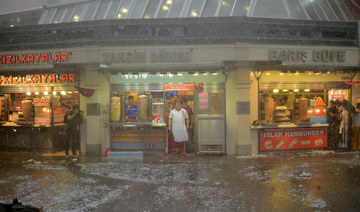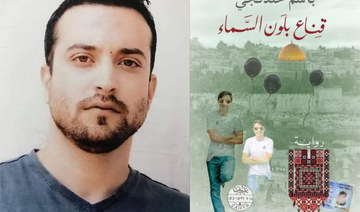The amount of time we spend looking for a good radio channel or playlist at home, the car or office is way more than anyone would like to admit. Finding the right track for your mood, getting the right frequency and getting that song in just the right volume that suits the mood is a challenge! The number of playlists out on the Internet can make your head spin, video playing apps do work at home, but are you sure that it won’t be disconnecting if you’re on the road? How can you be 100 percent sure that this is the right station for you? You really can’t, not to mention sparing yourself from cheesy radio hosts fake laughing their way through a show or playing music that really doesn’t sit with your state of mind. So how about a podcast? I mean who wouldn’t like to hear news on the go for the politicos out there, the latest for you tech-savvy geeks, the hottest new winged liner for the fashionista in you and just about everything else for the chilled individual greedily tapping on the keyboard so as not to forget her next sentence (guilty as charged).
Let’s talk podcasts. These have got to be the best creation that came out since radio; at least that’s my personal opinion (admit it you think so too). With more and more people tuning in to listen to podcasts, it’s gaining a lot more momentum lately than when it first started. So what is a podcast? It’s simply a digital show that you can download to your computer, phone or player, a portable radio show you can listen to whenever you want and wherever you want. Frankly, podcasts are amazing to listen to if you have some free time instead of spending that time in search for the right station or music, you have to learn something either way so why not through a podcast? A group of friends wanted to do just that, create a podcast and combine their different interests, talk about everything and nothing at all, educate but be the cool kids in class and joke around at the same time. After planning it for months and never finding the right time to do it, all it took is one lunch break at KAUST and that’s it, Mstdfr came to be. Ammar Sabban, Rami Taibah, Omair Taibah and Faisal Alaseeri gathered at Ammar’s home, brought out his recording gadgets and microphone and talked, just talked.
I wanted to know more about who the people behind Mstdfr are, they grabbed my attention with their name obviously, such a quirky Arabic slang and the content was intriguing as well. After a couple of podcast episodes, I requested to interview the bunch and I was kindly asked to participate in one of the podcast episodes. The conversation was between Rami, Faisal, Ammar and I and here’s what went down with all three giving their answers at the same time.
Let’s start with the name “Mstdfr”, what does it mean and how did you come up with it?
To start, the name popped up in the middle of our first ever podcast episode, we (Ammar Sabban, Rami and Omair Taibah, Faisal Alaseeri) were trying to find a proper name for ourselves and we didn’t want something normal, we wanted to geek out which was the whole purpose of the podcast actually, to geek out. So we were just talking about geeks at school and how they’re know-it-alls and we figured that “geek” in Arabic is “dafoor” and playing around with the word, “Mstdfr” popped up as a derivative of the word, and there it was, our name. Hi we are the guys behind “Mstdfr”
Tell me a bit about the concept behind the podcast?
We want to have fun basically. We welcome a guest for every podcast, we’re a diverse group of people and it’s in Arablish (mix of both English and Arabic). Each guest of course has a different background and to have a diverse group with diverse ideals and different life views keeps the conversation going sometimes more than the time intended when recording. Of course we do talk about their background and get an understanding of what they do and how they do it, we hear their story and we just go from there. We literally move from one topic to another keeping with the flow of the conversation because we’re having fun. Yeah we do poke around a bit and be all competitive, but all in the spirit of fun
How do you choose your topics? Are they totally random or do you have a list?
We do have a list of topics actually, they’re picked at random and we don’t really define each guest with a topic they’re most comfortable with. We’ll just call them up, ask them to join our podcast and allow the conversation to flow in and out of the topic at hand. We’re a diverse group, we don’t usually agree on everything and we tend to agree to disagree but that’s the fun part, to keep ourselves away from our comfort zones. Some of our topics run through current affairs, culture, technology, media, challenges facing the new Arab generation, and everything in between. This is how most conversations between friends are anyway, we’re just broadcasting it to the world to listen to with us.
How do you see your podcast progressing? Is it attracting as much listeners as you expected?
It was way more than we expected! We now have under our wing eight shows in Arablish, English and Arabic. We get good feedback and some even send long messages wanting to seriously interact and answer and comment as radio shows sometimes do but they can’t because it’s a podcast. Some of the comments that we get are hilarious, it’s a fun side activity for us and we have more ideas coming up and more guests too. It’s a podcast that caters to all.
I’ve been hearing Mstdfr this and Mstdfr that, you’re gaining a lot of momentum and I’ve been hearing people mention you every now and then. It’s been a year since you’ve launched and so far you’re ranking well up in the top 50 podcasts, why do you think so?
We think because of the diversity of our topics, we don’t stick to one topic per podcast, we can start anywhere from movies to bacteria, and we’re thankful for our listeners and followers. Because of them, the Mstdfr show is ranking in 4th place this month under top comedy podcasts in Saudi Arabia, we fell from 1st place last month but it’s all good. We also have “ilm fm” ranking 4th under technology and “eish btswi” in 38th place under education.
You guys are really enjoying this, aren’t you?
Yes we are, how can we not? We gather every few days, talk about anything and nothing. With the help of a guest, who might be shocked by the amount of straight forwardness in the conversation, but it’s how we like the flow to be; easy going, awkward, kinda embarrassing at times, knowledgable and educational not to mention understanding that our listeners want something different, new and fresh; that’s how we feel we represent and at least we don’t have a million cheesy and annoying radio advertisements in one show, that’s the best thing about podcasts, it’s nonstop!
We came a long way from our first episode, no more bleeping but we still get to talk no strings attached. A year later, we’ve created a studio now, people can actually come, rent out the room with an onsite producer at hand, microphones, a 12-track mixer and remote recording capabilities. Through our fun time recording podcasts, we’re encouraging more young Saudis who want to create a podcast to go ahead and do it, just have fun while doing it and innovative ideas are limitless.
You can download the MSTDFR show on your phone from the Apple Store, Windows Store, Google Store or listen to it on SoundCloud. You can also find the other shows on www.mstdfr.com
So check them out, it’s fun and hey, it’s free!
Saudi Arabia’s most talked about podcast talks about nothing at all!
Saudi Arabia’s most talked about podcast talks about nothing at all!
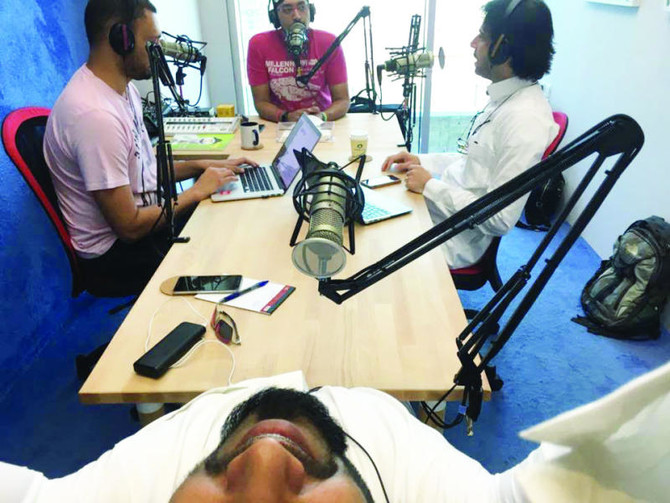
Meaty issue: German political party calls for €4.90 price cap on doner kebabs

- Die Linke appeals to government as price of national favorite hits €10 in some cities
- Scheme would cost taxpayer about €4bn
LONDON: German political party Die Linke has urged the government to cap the price of a much loved food item — the doner kebab.
The party has proposed providing daily vouchers to households that would limit prices to €4.90 ($5.28) and €2.90 for young people under an initiative known as Donerpreisbremse.
The scheme is projected to cost the government about €4 billion.
Introduced after the Second World War by Turkish immigrants who adapted the dish to suit local tastes, the doner kebab is a national favorite in Germany, with an estimated 1.3 billion consumed annually. But their soaring price has become a hot-button political issue.
Die Linke said the cost of a doner kebab had reached €10 in some cities, from €4 just two years ago.
“For young people right now it is an issue as important as where they will move when they leave home,” said Hanna Steinmuller, a lawmaker with the Greens party.
“I know it’s not an everyday issue for many people here … but I think as voter representatives we are obliged to highlight these different perspectives.”
German Chancellor Olaf Scholz was famously confronted by a voter last year who demanded he “speak with Putin … I’m paying €8 for a doner.”
With public pressure mounting, Scholz recently acknowledged on social media that “everywhere I go, mostly by young people, I get asked if there should be a price cap for doner kebabs.”
Despite the appeals, the chancellor rejected the proposal, citing the impracticality of price controls in a free market economy.
Despite its humble origins as a street food, the doner kebab has become an unexpected point of political focus.
Last month, German President Frank-Walter Steinmeier sparked controversy when on a visit to Turkiye he gifted 60 kg of kebab meat from Berlin to Istanbul in what some called a clumsy attempt to symbolize the strong cultural ties between the two nations.
A 98-year-old in Ukraine walked miles to safety from Russians, with slippers and a cane
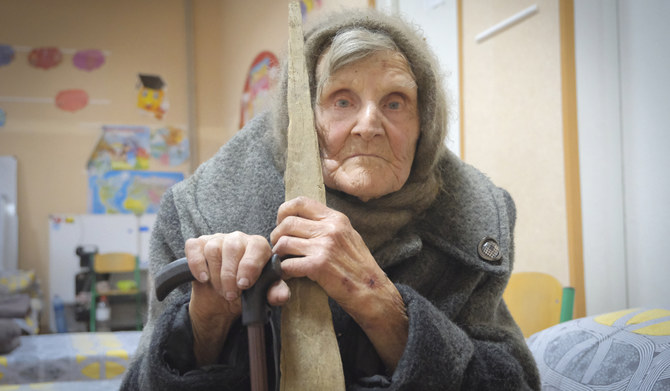
- Describing her journey, the nonagenarian said she had fallen twice and was forced to stop to rest at some points, even sleeping along the way before waking up and continuing her journey
KYIV, Ukraine: A 98-year-old woman in Ukraine who escaped Russian-occupied territory by walking almost 10 kilometers (6 miles) alone, wearing a pair of slippers and supported by a cane has been reunited with her family days after they were separated while fleeing to safety.
Lidia Stepanivna Lomikovska and her family decided to leave the frontline town of Ocheretyne, in the eastern Donetsk region, last week after Russian troops entered it and fighting intensified.
Russians have been advancing in the area, pounding Kyiv’s depleted, ammunition-deprived forces with artillery, drones and bombs.
“I woke up surrounded by shooting all around — so scary,” Lomikovska said in a video interview posted by the National Police of Donetsk region.
In the chaos of the departure, Lomikovska became separated from her son and two daughters-in-law, including one, Olha Lomikovska, injured by shrapnel days earlier. The younger family members took to back routes, but Lydia wanted to stay on the main road.
With a cane in one hand and steadying herself using a splintered piece of wood in the other, the pensioner walked all day without food and water to reach Ukrainian lines.
Describing her journey, the nonagenarian said she had fallen twice and was forced to stop to rest at some points, even sleeping along the way before waking up and continuing her journey.
“Once I lost balance and fell into weeds. I fell asleep … a little, and continued walking. And then, for the second time, again, I fell. But then I got up and thought to myself: “I need to keep walking, bit by bit,’” Lomikovska said.
Pavlo Diachenko, acting spokesman for the National Police of Ukraine in the Donetsk region, said Lomikovska was saved when Ukrainian soldiers spotted her walking along the road in the evening. They handed her over to the “White Angels,” a police group that evacuates citizens living on the front line, who then took her to a shelter for evacuees and contacted her relatives.
“I survived that war,’ she said referring to World War II. “I had to go through this war too, and in the end, I am left with nothing.
“That war wasn’t like this one. I saw that war. Not a single house burned down. But now – everything is on fire,” she said to her rescuer.
In the latest twist to the story, the chief executive of one of Ukraine’s largest banks announced on his Telegram channel Tuesday that the bank would purchase a house for the pensioner.
“Monobank will buy Lydia Stepanivna a house and she will surely live in it until the moment when this abomination disappears from our land,” Oleh Horokhovskyi said.
Amazon Purr-rime: Cat accidentally shipped to online retailer

- Galena was found safe by a warehouse worker at an Amazon center after vanishing from her home in Utah
LOS ANGELES: A curious cat that sneaked into an open box was shipped across the United States to an Amazon warehouse after its unknowing owners sealed it inside.
Carrie Clark’s pet, Galena, vanished from her Utah home on April 10, sparking a furious search that involved plastering “missing” posters around the neighborhood.
But a week later, a vet hundreds of miles (kilometers) away in Los Angeles got in touch to say the cat had been discovered in a box — alongside several pairs of boots — by a warehouse worker at an Amazon center.
“I ran to tell my husband that Galena was found and we broke down upon realizing that she must have jumped into an oversized box that we shipped out the previous Wednesday,” Clark told KSL TV in Salt Lake City.
“The box was a ‘try before you buy,’ and filled with steel-toed work boots.”
Clark and her husband jetted to Los Angeles, where they discovered Amazon employee Brandy Hunter had rescued Galena — a little hungry and thirsty after six days in a cardboard box, but otherwise unharmed.
“I could tell she belonged to someone by the way she was behaving,” said Hunter, according to Amazon.
“I took her home that night and went to the vet the next day to have her checked for a microchip, and the rest is history.”
What did people eat before agriculture? New study offers insight
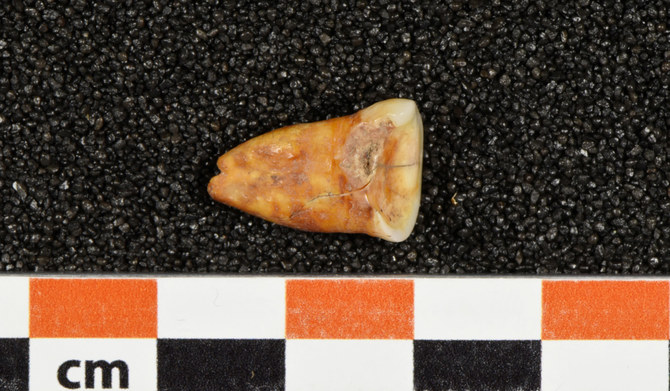
- Analysis of forms — or isotopes — of elements including carbon, nitrogen, zinc, sulfur and strontium in these remains indicated the type and amount of plants and meat they ate
WASHINGTON: The advent of agriculture roughly 11,500 years ago in the Middle East was a milestone for humankind — a revolution in diet and lifestyle that moved beyond the way hunter-gatherers had existed since Homo sapiens arose more than 300,000 years ago in Africa.
While the scarcity of well-preserved human remains from the period preceding this turning point has made the diet of pre-agricultural people a bit of a mystery, new research is now providing insight into this question. Scientists reconstructed the dietary practices of one such culture from North Africa, surprisingly documenting a heavily plant-based diet.
The researchers examined chemical signatures in bones and teeth from the remains of seven people, as well as various isolated teeth, from about 15,000 years ago found in a cave outside the village of Taforalt in northeastern Morocco. The people were part of what is called the Iberomaurusian culture.
Analysis of forms — or isotopes — of elements including carbon, nitrogen, zinc, sulfur and strontium in these remains indicated the type and amount of plants and meat they ate. Found at the site were remains from different edible wild plants including sweet acorns, pine nuts, pistachio, oats and legumes called pulses. The main prey, based on bones discovered at the cave, was a species called Barbary sheep.
“The prevailing notion has been that hunter-gatherers’ diets were primarily composed of animal proteins. However, the evidence from Taforalt demonstrates that plants constituted a big part of the hunter-gatherers’ menu,” said Zineb Moubtahij, a doctoral student in archaeology at the Max Planck Institute for Evolutionary Anthropology in Germany and lead author of the study published on Monday in the journal Nature Ecology & Evolution.
“It is important as it suggests that possibly several populations in the world already started to include substantial amount of plants in their diet” in the period before agriculture was developed, added archeogeochemist and study co-author Klervia Jaouen of the French research agency CNRS.
The Iberomaurusians were hunter-gatherers who inhabited parts of Morocco and Libya from around 25,000 to 11,000 years ago. Evidence indicates the cave served as a living space and burial site.
These people used the cave for significant portions of each year, suggesting a lifestyle more sedentary than simply roaming the landscape searching for resources, the researchers said. They exploited wild plants that ripened at different seasons of the year, while their dental cavities illustrated a reliance on starchy botanical species.
Edible plants may have been stored by the hunter-gatherers year-round to guard against seasonal shortages of prey and ensure a regular food supply, the researchers said.
These people ate only wild plants, the researchers found. The Iberomaurusians never developed agriculture, which came relatively late to North Africa.
“Interestingly, our findings showed minimal evidence of seafood or freshwater food consumption among these ancient groups. Additionally, it seems that these humans may have introduced wild plants into the diets of their infants at an earlier stage than previously believed,” Moubtahij said.
“Specifically, we focused on the transition from breastfeeding to solid foods in infants. Breast milk has a unique isotopic signature, distinct from the isotopic composition of solid foods typically consumed by adults.”
Two infants were among the seven people whose remains were studied. By comparing the chemical composition of an infant’s tooth, formed during the breastfeeding period, with the composition of bone tissue, which reflects the diet shortly before death, the researchers discerned changes in the baby’s diet over time. The evidence indicated the introduction of solid foods at around the age of 12 months, with babies weaned earlier than expected for a pre-agricultural society.
North Africa is a key region for studying Homo sapiens evolution and dispersal out of Africa.
“Understanding why some hunter-gatherer groups transitioned to agriculture while others did not can provide valuable insights into the drivers of agricultural innovation and the factors that influenced human societies’ decisions to adopt new subsistence strategies,” Moubtahij said.
Palestinian prisoner in Israel wins top fiction prize
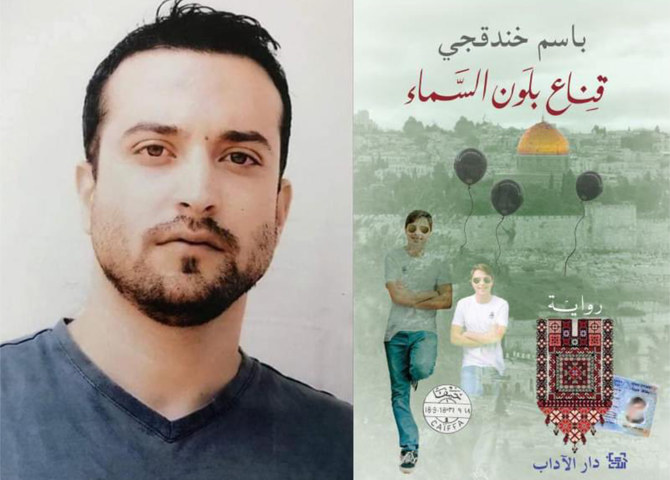
- The mask in the novel’s title refers to the blue identity card that Nur, an archaeologist living in a refugee camp in Ramallah, finds in the pocket of an old coat belonging to an Israeli
ABU DHABI: Palestinian writer Basim Khandaqji, jailed 20 years ago in Israel, won a prestigious prize for Arabic fiction on Sunday for his novel “A Mask, the Color of the Sky.”
The award of the 2024 International Prize for Arabic Fiction was announced at a ceremony in Abu Dhabi.
The prize was accepted on Khandaqji’s behalf by Rana Idriss, owner of Dar Al-Adab, the book’s Lebanon-based publisher.
Khandaqji was born in the Israeli-occupied West Bank city of Nablus in 1983, and wrote short stories until his arrest in 2004 at the age of 21.
He was convicted and jailed on charges relating to a deadly bombing in Tel Aviv, and completed his university education from inside jail via the Internet.
The mask in the novel’s title refers to the blue identity card that Nur, an archaeologist living in a refugee camp in Ramallah, finds in the pocket of an old coat belonging to an Israeli.
Khandaqji’s book was chosen from 133 works submitted to the competition.
Nabil Suleiman, who chaired the jury, said the novel “dissects a complex, bitter reality of family fragmentation, displacement, genocide, and racism.”
Since being jailed Khandaqji has written poetry collections including “Rituals of the First Time” and “The Breath of a Nocturnal Poem.”
He has also written three earlier novels.







